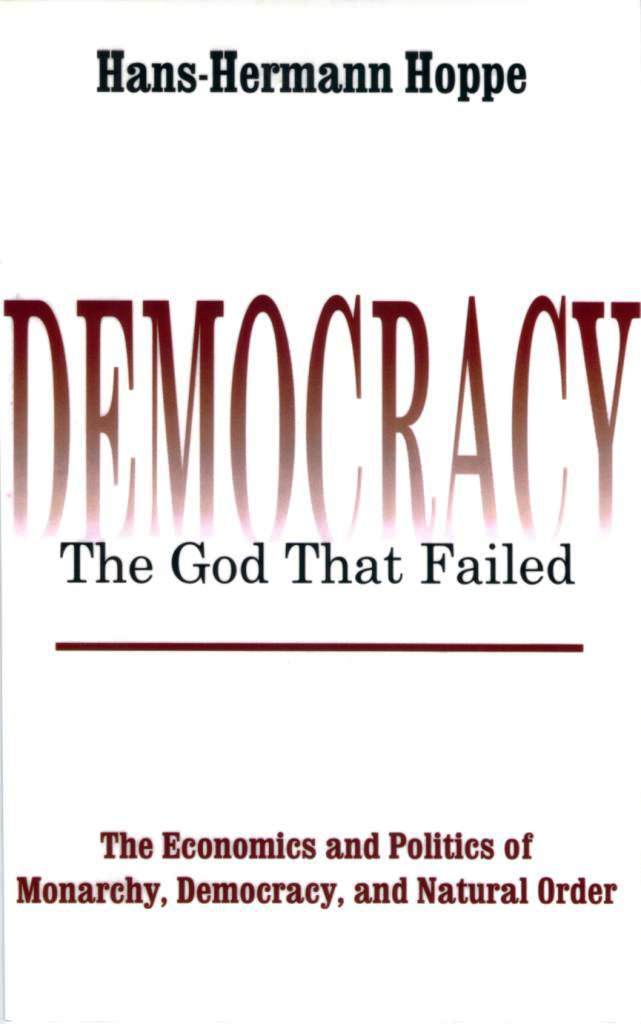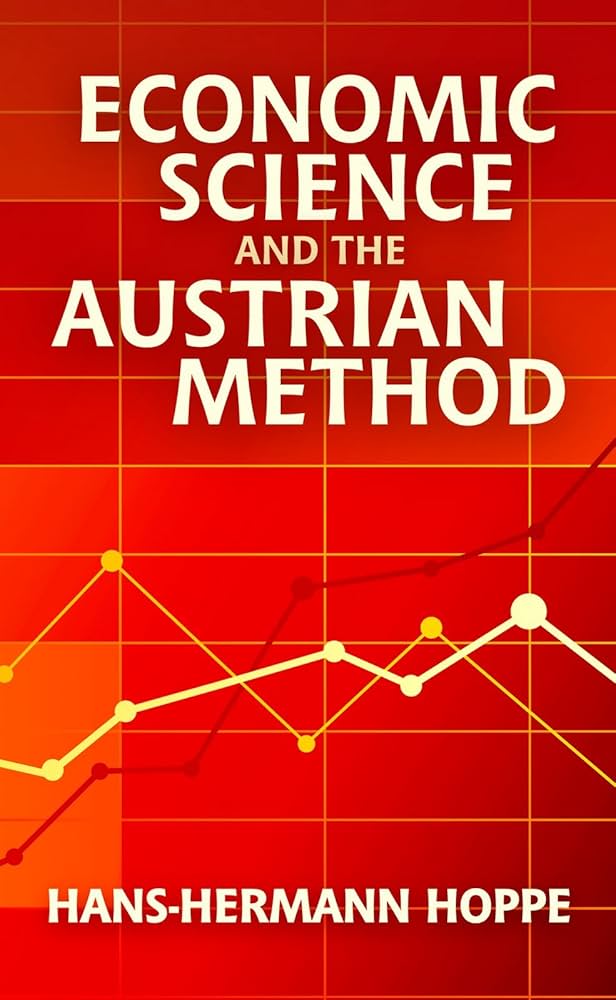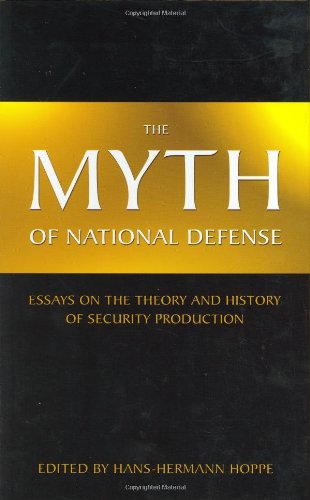De la théorie économique du laissez-faire à la politique du liberalisme has just been posted (see below). This is a French translation of chapter 11, “From the Economics of Laissez Faire to the Ethics of Libertarianism,” and the Appendix, “Four Critical Replies,” of The Economics and Ethics of Private Property.
Professor Hoppe’s article, “Entrepreneurship With Fiat Property and Fiat Money,” was published today on LewRockwell.com, and is based on a speech first delivered at the Edelweiss Holdings Symposion held in Zuerich, Switzerland, on September 17, 2011.
Update: Republished in Mises Daily on Nov. 18, 2011.
Professor Hoppe has the following upcoming speaking events:
- Speaking at the Bucharest Academy of Economic Studies (November 9, 2011)
- Speaking at the Romanian-American University (November 10, 2011)
- On November 21, at the invitation of Hong Kong’s Lion Rock Institute, he will speak at the Foreign Correspondents’ Club in Hong Kong;
- On November 25 and 26, he will speak in Sydney, at a conference and seminar organized by the Australian Mises Institute;
- On November 28, he will be a dinner speaker at the Royal Sydney Yacht Squadron;
- On November 30, Professor Hoppe will conduct a seminar at the Mannkal Foundation in Perth.
Professor Hoppe’s article, Social Democratic Hayek: An Interview with Hans-Hermann Hoppe by Mateusz Machaj, previously published in Polish as Socjaldemokratyczny Hayek, has been translated into Swedish as Intervju med Hans-Hermann Hoppe om Hayek, Mises Sweden, Oct. 13 2011.
Related articles by Professor Hoppe include: “Why Mises (and not Hayek)?“, Mises Daily (Oct. 10, 2011) and F.A. Hayek on Government and Social Evolution: A Critique, Review of Austrian Economics, Vol. 7 Num. 1 (1994)
Professor Hoppe’s article, Why the State Demands Control of Money, was published in Mises Daily today. It is based on a speech delivered at the Mises Institute Supporters meeting, September 19–23, 2011, Vienna, Austria. The piece revisits issues discussed in his article Banking, Nation States and International Politics: A Sociological Reconstruction of the Present Economic Order, which also appears as Ch. 3 of his The Economics and Ethics of Private Property.
Update: This article was republished on 8/11/2021 on Mises.org.
Professor Hoppe’s article, Why Mises (and not Hayek)?, was published in Mises Daily today. It is based on a speech delivered at the Mises Institute Supporters meeting, September 19-23, 2011, Vienna, Austria.
Professor Hoppe taught five classes at the Mises U 2011 in Auburn, Alabama, this past July, including his great speech The Science of Human Action, which kicked off Mises U (his other Mises U 2011 lectures are here). In this speech, Professor Hoppe discusses his intellectual biography and relationship with Rothbard, as well as the Austrian approach and methodology. While he was in town, Jeff Tucker conducted a fascinating interview with him (see video below). In this wide-ranging interview, Professor Hoppe discusses in more detail the history of his intellectual odyssey from leftist to Misesian-Rothbardian, his various books, various topics such as German reintegration, the centralizing effects of constitutions (including the US Constitution and EU), why states with more liberal economies are more imperialist, the interesting and heretofore undisclosed story of exactly how communist policies in East Germany led him to discover Mises, and more.
As announced on B.K. Marcus’s post at the Mises blog today (see below), the Hoppe festschrift that Guido Hülsmann and I edited, Property, Freedom, and Society: Essays in Honor of Hans-Hermann Hoppe (Mises Institute, 2009), which was already available in PDF and print, is now available in a free epub format as well. Kindle and other ebook formats should be available soon. The festschrift was presented to Professor Hoppe, just a month or so before his 60th birthday, at a private ceremony on July 29, 2009, in Auburn, AL during Mises University 2009 (see Hoppe Festschrift Published). Pictures from the ceremony are embedded below.
Hoppe’s Festschrift now in ePub
Also, as I noted in Book Review of Hoppe Festschrift, David Howden wrote an excellent review of the festschrift in New Perspectives on Political Economy. And, as I noted in that post, and in Bodrum Days and Nights: The Fifth Annual Meeting of the Property and Freedom Society: A Partial Report, as a piece of Festschrift trivia: at the recent Property and Freedom Society conference in Bodrum, Turkey, a guest presented a festschrift-cake he had had made in Estonia, entitled “Property, Freedom, and Society: Marzipan in Honor of Hans-Hermann Hoppe,” which was served as part of the dessert at the closing banquet.
Reposted from Andy Duncan’s blog, The God that Failed:
Principato di Filettino: A step on the road to Hoppe World?
Posted on September 3, 2011 by Andy Duncan
In the magnificent Peter Sellers film, The Mouse That Roared, the strangely English-speaking Duchy of Grand Fenwick, a tiny nation between France and Switzerland, defeats the United States in a rather bizarre nuclear stand-off.
Will another such Duchy, the tiny Italian town of Filettino, similarly defeat the horrible coerced agglomeration known as Italy, inside the even more horrible coerced agglomeration known as the European Union?
We can but hope.
For Filettino has declared its independence from Rome, in a bid to emulate San Marino, Monaco, the Vatican City, and Andorra (and I suppose the Cantons of Switzerland itself, when they shook off the First Reich of the mass murderer Charlemagne, and his rotten Holy Roman Empire).
Obviously, we will see if Filettino’s independence lasts, or if it is just another political stunt, but it is an interesting event to witness nevertheless. For when in the future we look back from ‘Hoppe World’ and work out how we got there, historians will regard such incidents as being symptomatic of a wider terminal malaise of coerced collectivism:
Go Filettino!
Interviu cu Hans-Hermann Hoppe despre taxare, the Romanian translation of Professor Hoppe’s Philosophie Magazine Interview on Taxation, has just been posted on the Mises Romania site. It has also been translated into several other languages.
In this humorous interview parody, Exclusive Oliver Marc Hartwich Interview on Hans-Hermann Hoppe, Benjamin Marks skewers the confused criticism of Professor Hoppe’s ideas by one … confused critic.
PFS friend Benjamin Marks has a witty post about Professor Hoppe’s upcoming participation in the Australian Mises Seminar (25-26th November, 2011, Macquarie University, Sydney): Why the 2012 double Nobel laureate is coming to Sydney.
Professor Hoppe delivered the following lectures at Mises U 2011:
-
Probability and Insurance (Saturday, July 30, 2011)
-
Property and the Social Order (Thursday, July 28, 2011)
-
Advanced Graduate Seminar (Tuesday, July 26, 2011)
-
Praxeology: The Method of Economics (Monday, July 25, 2011)
-
The Science of Human Action (Sunday, July 24, 2011)
Recent addition to online translations: ??-???·???????????????????, Chinese translation of Socialism: A Property or Knowledge Problem? (RAE, Vol. 9 Num. 1), translated by Nicolas DONG.
John Derbyshire, attendee of the 2011 PFS Annual Meeting, reflects on this experience there in Taki’s Magazine:
The Shadow Science of Economics
June 02, 2011
I spent the Memorial Day weekend as a guest of Professor Hans-Hermann Hoppe’s Property and Freedom Society at their annual conference in Bodrum, Turkey. It was a wonderfully relaxing break, for which I am very much obliged to the good professor, his charming wife, and their co-organizers. I gave a talk about China and got to see some of Turkey (a country that was new to me), and I listened to some interesting and instructive lectures.
The PFS exists to help promote the economic and political libertarianism of Ludwig von Mises and Murray Rothbard. I was in Bodrum because Prof. Hoppe was kind enough to invite me, not because I am a particularly dogmatic disciple of those gents. I approve of them and their doctrines in a vague, general sort of way, as I approve of anything much to the right of the statist elephantiasis dominant in the modern West and which looks to be sailing into some great crisis in the near future.
On the other hand I have issues with libertarianism—with free trade, for instance, and with the open-borders dogma that too many libertarians (though not all the ones at Bodrum, perhaps not even a majority) cling to with religious zeal.
Very nice reflections on the recent 2011 PFS Annual Meeting by attendee Benjamin Marks:
by Benjamin Marks, Economics.org.au editor-in-chief
and Mencken’s Conservatism author
In light of the furore arising from my appointment as editor-in-chief of the Australian economics organisation, Economics.org.au, it was decided that I travel as far away from Australia as I could until the media frenzy subsided. I was philosophical about this, figuring that having reached the pinnacle of the Australian economics profession with my appointment, the only challenges left for me were abroad anyway. So, in my new capacity as senior foreign correspondent for Economics.org.au, I attended the 6th Annual Property and Freedom Society (PFS) Conference in Bodrum, Turkey.
The significance of the conference being in Turkey cannot be understated. There was a gaudy Turkish election campaign of some sort playing out during the conference, and big clunky polluting vehicles were driven around the poorly-maintained and traffic-clogged streets with loud songs and speeches advertising the candidates. Imagine an ice cream van that went three times as fast, emitted noise almost as irritating as “Greensleeves” and offered something people had to be forced to fund. Pedestrians were treated like taxpayers. Despite not understanding the language that the election profundities were in — I was the only conference participant who was not at least bilingual —, they were still just as comprehensible to me as the confabulations of English-speaking politicians. [continue reading…]
[continue reading…]
Nice review of the 2011 PFS Annual Meeting by Andy Duncan: A Few Days outside the Asylum.
A Few Days outside the Asylum
Mises Daily: Wednesday, June 15, 2011 by Andy Duncan

[The Cobden Centre (2011)]
Hitchhiker’s Guide to the Galaxy fans may remember a splendid character (first appearing in So Long, and Thanks for all the Fish) called Wonko the Sane, who lived upon the Earth outside of the asylum. I now know how Wonko felt.
Being a man who claims to be the hardest hard-core Rothbardian in England, (and it’s pistols at dawn in the mist for anyone who wishes to argue the point), I feel I was last inside the bubble of civilization two years ago, when I was lucky enough to be invited to Professor Hans-Hermann Hoppe’s Property and Freedom Society conference, held in 2009. The two years since, inside the asylum, have passed in a hilarious blur as various pin-headed identikit Labservatives or Conliberals jaw-boned at each other (at my expense) about how different they are from each other, because some like pink dots on their blue ties while others prefer yellow dots on their pink ties.
Oh, how Jonathan Swift so beautifully captured the futility of anyone believing in the usefulness of politicians with his immortal book, Gulliver’s Travels, and his description of the ropedancers: [continue reading…]
Two presentations by Prof. Hoppe (in German) from September 24 2010, Philosophicum Lech 2010, “Der Staat, Wieviel Herrschaft braucht der Mensch?”:
- Vortrag von Univ. Prof. Dr. Hans-Hermann Hoppe, “Staat oder Privatrechtsgesellschaft” (45MB MP3 file),
- Vortrag von Univ. Prof. Dr. Hans-Hermann Hoppe, “Staat oder Privatrechtsgesellschaft” (68MB MP3 file)
The text is available on Hoppe’s German Translations page: Staat oder Privatrechtsgesellschaft? [Text of speech delivered at the 14th Philosophicum Lech, 24 Sept. 2010].














